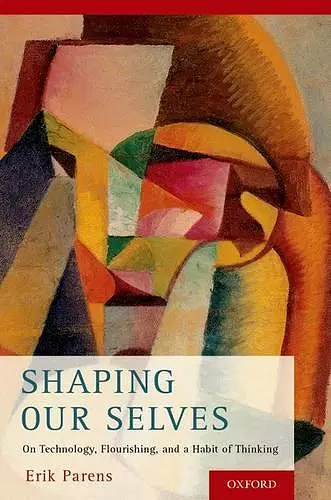Shaping Our Selves
On Technology, Flourishing, and a Habit of Thinking
Format:Hardback
Publisher:Oxford University Press Inc
Published:13th Nov '14
Currently unavailable, and unfortunately no date known when it will be back
This hardback is available in another edition too:
- Paperback£31.49(9780190645892)

When bioethicists debate the use of technologies like surgery and pharmacology to shape our selves, they are, ultimately, debating what it means for human beings to flourish. They are debating what makes animals like us truly happy, and whether the technologies at issue will bring us closer to or farther from such happiness. The positions that participants adopt in debates regarding such ancient and fundamental questions are often polarized, and cannot help but be deeply personal. It is no wonder that the debates are sometimes acrimonious. How, then, should critics of and enthusiasts about technological self-transformation move forward? Based on his experience at the oldest free-standing bioethics research institute in the world, Erik Parens proposes a habit of thinking, which he calls "binocular." As our brains integrate slightly different information from our two eyes to achieve depth of visual perception, we need to try to integrate greatly different insights on the two sides of the debates about technologically shaping our selves-if depth of intellectual understanding is what we are after. Binocular thinking lets us benefit from the insights that are visible from the stance of the enthusiast, who emphasizes that using technology to creatively transform our selves will make us happier, and to benefit from the insights that are visible from the stance of the critic, who emphasizes that learning to let our selves be will make us happier. Parens observes that in debates as personal as these, we all-critics and enthusiasts alike-give reasons that we are partial to. In the throes of our passion to make our case, we exaggerate our insights and all-too-often fall into the conceptual traps that language sets for us. Foolishly, we make conceptual choices that no one who truly wanted understanding would accept: Are technologies value-free or value-laden? Are human beings by nature creators or creatures? Is disability a medical or a social phenomenon? Indeed, are we free or determined? Parens explains how participating in these debates for two decades helped him articulate the binocular habit of thinking that is better at benefiting from the insights in both poles of those binaries than was the habit of thinking he originally brought to the debates. Finally, Parens celebrates that bioethics doesn't aspire only to deeper thinking, but also to better...
One will read this book and be persuaded by the approachâThis volume will prove useful for those approaching this subject for the first time and Parens provides brief but useful discussions of various arguments in the enhancement controversies related to antidepressants and disabilities to illustrate both monocular and binocular approaches. * Russell W. Askren, Metapsychology Online Reviews *
This is a wise and beautifully written book, which heralds the next wave in the bioethical analysis of the 'enhancement' uses of biomedical technologies and body-shaping surgeries. Parens' 'binocular' habit of thinking is just what the field needs now, and applies well beyond the specific issues addressed in this volume. * Eric Juengst, University of North Carolina, Chapel Hill *
In this cogent and lucidly written work, Parens provides a clear-headed and open-hearted approach to dealing with the vexing questions raised by enhancement technologies. The use of technologies by which humans try to shape their bodies and their destinies must be viewed, he persuades us, by using two lenses at once-an approach that achieves depth of intellectual vision by benefitting from the insights of critics and enthusiasts alike. In the end, we have to take a stance, but we come to it not through an agonistic 'win the argument' approach, but through a careful, empathetic understanding of both positions. This judicious approach is so desperately needed in a combative discipline like philosophy and its offspring bioethics and still more a world filled with conflict and strife where too many think only through one self-righteous and dogmatic lens. * Eva Feder Kittay, Stony Brook University *
Chapter 6 alone is worth the price of the book. To look at enhancement technologies through Parens's binoculars is to bring them into lucid ethical focus. At the same time one sees a charming, gentle, and deeply knowledgeable man reaching out reconciling hands to fit together the insights from both critics and enthusiasts. * Hilde Lindemann, Michigan State University *
This is a book of remarkable clarity and balance; it illuminates important issues in bioethics with a substantial degree of care and respect for opposing perspectives in difficult, ongoing debates about the body, identity, disability and technology. Erik Parens' determined vision of a middle-ground in these debates challenges the 'knockers' and the 'boosters' to abandon their respective megaphones and discover more of what they might have in common. This is an essential book especially for those starting out in bioethics; would that there were more books that gave students a balanced perspective on 'hot' issues from the start. * Ilina Singh, Kings College London *
ISBN: 9780190211745
Dimensions: 145mm x 211mm x 23mm
Weight: 363g
216 pages